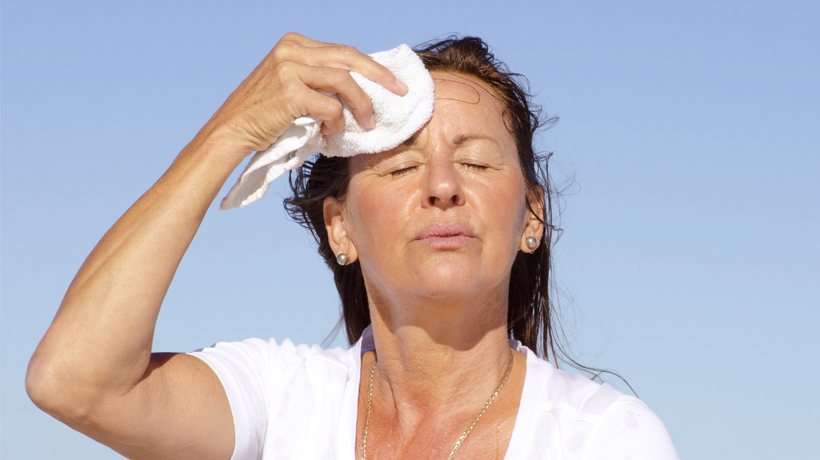Can we open a window in here?
Hot flashes are an uncomfortable symptom that happens to two thirds of North American menopausal women, according to WebMD. They’re a sudden feeling of warmth that are usually accompanied by a red, flushed face and sweating.
Hot flashes happen when blood vessels near the skin’s surface widen to cool off and cause sweat. When they happen during sleep, they’re called night sweats.
While there isn’t exactly a cure for this symptom, there are several ways to relieve hot flashes naturally. There are also a few drug treatments that might help; however, you should talk to your doctor about what works best for you.
Keep it mild
Foods and drinks that raise body temperature can trigger a hot flash. Spicy foods with cayenne, chili powder, and hot peppers like jalapeños have a compound call capsaicin that can expand blood vessels that might cause hot flashes, according to the medical website Everyday Health. Avoiding hot beverages, like a piping hot tea, might also limit the severity of a hot flash.
Get fishy
Salmon has several nutrients that can help with hot flashes, according to the health website Medical News Today. This fish has proteins and omega-3 fatty acids that help guide healthy hormone and nerve signaling.
Take up yoga
Stress releases a substance called epinephrine, which increases body temperature and sweating, according to Medical News Today. Relaxing activities may help reduce the severity of hot flashes. The National Institute on Aging (from the U.S. Department of Health & Human Services), or NIA, says early-stage research has shown that mindfulness meditation, yoga, and tai chi may help improve menopausal symptoms.
Avoid alcohol
While a refreshing, icy cocktail may sound tempting, the NIA says alcohol can make menopausal symptoms worse. If you’re looking to avoid hot flashes, try to limit alcohol consumption.
Maintain a healthy weight
Women who are overweight or obese may experience more intense and/or more frequent hot flashes, according to the NIA. A balanced diet and regular exercise can help manage weight, even when it may seem more difficult during menopause.
Go soy
According to Medical News Today, many plants contain compounds called phytoestrogens (or dietary estrogens) which are capable of binding to human estrogen receptors. These plant-based estrogens may help menopausal women by increasing the effect of estrogen on the body. Soybeans, chickpeas, lentils, and flaxseed may have weaker estrogen-like effects that could reduce hot flashes.
Two non-natural methods
The U.S. Food and Drug Administration has approved an antidepressant called paroxetine (Brisdelle) for hot flash relief. More commonly, many women use hormone therapy to steady levels of estrogen and progesterone in the body. The NIA says hormone therapy can be highly effective for women who are able to use it. However, hormone therapy can increase the risk of heart attack, stroke, blood clots, breast cancer, gallbladder disease, and dementia.
In 2002, a study that was funded by the National Institutes of Health was stopped early because researchers discovered those risks of heart attack, stroke, and more. This study left many women wary of using hormones.
However, research reported since then found that younger women may be at less risk and have more potential benefits than was suggested by that study. The negative effects of those hormone treatments mostly affected women who were over age 60 and post-menopausal.
Talk to your doctor to help make a decision that works best for you.
Sources:
https://www.webmd.com/menopause/guide/menopause-hot-flashes#1
https://www.verywellhealth.com/cool-ways-to-stop-hot-flashes-2322681
https://www.everydayhealth.com/womens-health/menopause/11-surprising-hot-flash-triggers/
https://www.medicalnewstoday.com/articles/317523.php
https://www.ncbi.nlm.nih.gov/pubmed/23553160
https://www.nia.nih.gov/health/hot-flashes-what-can-i-do
https://psychnews.psychiatryonline.org/doi/full/10.1176/pn.37.7.0029



